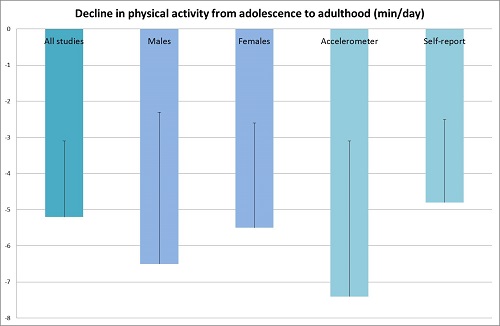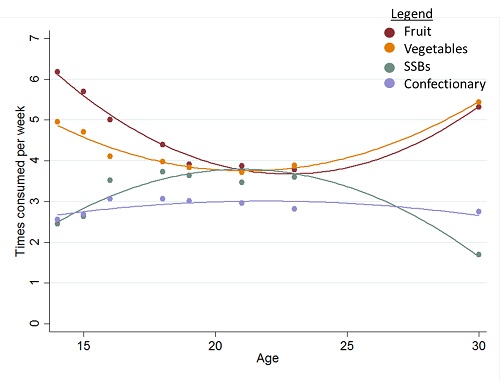Overview
Late adolescence to early adulthood is the time of life when overweight and obesity rise the fastest, but we know little about the factors that drive changes in obesity-related behaviours, such as diet and physical activity over this period. Adolescence and early adulthood is a time of rapid personal development, incorporating many life events such as changes in living situation, education/occupational status, relationships and parenthood. These life events may incorporate changes in social and physical environments and financial resources, identified as determinants of health behaviour. Our research aims to understand the processes and mechanisms that shape behaviour during this period, to determine how best to intervene in this age group to promote establishment of healthy behaviours which persist in adulthood.
Key Researchers
Systematic literature reviews on longitudinal changes in diet and physical activity from adolescence into adulthood
We have conducted a series of systematic reviews examining changes in physical activity and diet from adolescence to adulthood. We showed a decline in physical activity of ~5 min/day/year over this time. Examination of sugar consumption showed a reduction in added sugar intake over time. A scoping review of longitudinal diet data over this age range identified significant gaps and limitations in the data available: low density of repeated measurements within cohorts, little data reported beyond the early twenties, poor quality of dietary assessment methods. These reviews identified a need for further primary research to understand behaviour change over this period of life, and across young adult life events.

Observational analysis of longitudinal cohorts and cross-sectional datasets
In a Norwegian longitudinal cohort we showed a decrease in fruit and vegetable consumption and an increase in confectionery and sugar-sweetened beverage consumption from adolescence to early adulthood, with larger changes seen in males than females. Within-person changes in diet in the Norwegian cohort were associated with particular life events: leaving the parental home and leaving education.
Analysis of the cross-sectional UK National Diet and Nutrition Survey showed changes in different food groups across the adolescent to early adulthood age range. There was an increase in vegetable intake with age in both males and females from age 13 to 30, and particularly low levels of fruit and dairy intake seen among young men (aged 19-21).
We demonstrated the importance of simultaneously considering multiple behaviours and outcomes in longitudinal analyses using data from a Scottish cohort. Unhealthy behaviours were prevalent and suggest the importance of preventing a range of risk behaviours throughout adolescence, considering alcohol in weight-related adolescent health promotion, and understanding associations between contemporary screen use and mental health.

Systematic literature reviews of changes in diet, physical activity and adiposity across life events in early adulthood (ongoing)
These reviews look at studies which report on changes in diet, physical activity and adiposity across life events such as leaving education, starting employment, and becoming a parent. We are reviewing studies which report on longitudinal data with at least two data collection points either side of a life event, between the ages of 15 and 35 years. This review is registered on Prospero (CRD42018106943). Synthesising the literature with the proposed meta-analyses will provide a much needed quantitative estimate of the nature of change in behaviour and health over life events. The diverse nature of the evidence, spanning different specialities (physical activity, diet, obesity research, life course studies, work restricted to specific life events), makes a systematic review particularly valuable.
Following adolescents into adulthood (FAIA): A multiple method study to investigate recruitment and retention of adolescents and young adults in longitudinal cohort studies (Completed)
The aim of FAIA study was to use focus groups to understand how researchers can best recruit and retain adolescents and young adults in long-term research studies. We talked to adolescents and young adults who were both in and out of full time education to discuss topics important for a future study including ways of recruiting participants, ways of measuring physical activity, best ways of contacting people, types of contact details and incentives/rewards. This was conducted in parallel with a systematic mapping review assessing recruitment and retention strategies. Only studies aimed at recruiting and retaining participants into population-based longitudinal studies were synthesised using meta-analysis or narrative synthesis as appropriate.
Publications
- Corder K, Winpenny E, Atkin AJ, van Sluijs EMF, Sweeting H. Adolescent health behaviours and longitudinal associations with weight, psychological distress and academic achievement in emerging adulthood (in submission).
Systematic literature reviews
- Winpenny EM, Penney TL, Corder K, White M, van Sluijs EMF (2017) Change in diet in the period from adolescence to early adulthood: a systematic scoping review of longitudinal studies. International Journal of Behavioral Nutrition and Physical Activity 14,60.
- Winpenny EM, Penney TL, Corder K, White M, van Sluijs EMF. (2017) Changes in consumption of added sugars from age 13 to 30 years: a systematic review and meta-analysis of longitudinal studies. Obesity Reviews 18, 1336-1349.
- Corder KL, Winpenny E, Love R, Brown HE, White M, van Sluijs EMF (2017) Change in physical activity from adolescence to early adulthood: a systematic review and meta-analysis of longitudinal cohort studies. British Journal of Sports Medicine pii: bjsports-2016-097330.
Observational analysis
- Winpenny EM, van Sluijs EMF, White M, Klepp K-I, Wold B, Lien N. (2018) Changes in diet through adolescence and early adulthood: longitudinal trajectories and association with key life transitions. International Journal of Behavioral Nutrition and Physical Activity 15, 86.
- Winpenny EM, Greenslade S, Corder K, van Sluijs EMF (2018) Diet Quality through Adolescence and Early Adulthood: Cross-Sectional Associations of the Dietary Approaches to Stop Hypertension Diet Index and Component Food Groups with Age. Nutrients 10,1585.

 MRC Epidemiology Unit
MRC Epidemiology Unit